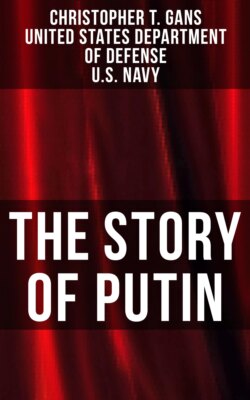Читать книгу The Story of Putin - United States Department of Defense - Страница 6
На сайте Литреса книга снята с продажи.
C. HYPOTHESIS AND THEORY
ОглавлениеTable of Contents
One major issue investigated in this thesis is the connection between Vladimir Putin’s anti-Americanism and the anti-Americanism of the Russian population. That population includes the general public and Putinist elites. The thesis shall also attempt to gauge the domestic political benefits garnered by Putin’s anti-Americanism within the authoritarian system that he has created.
Peter Katzenstein and Robert Keohane define anti-Americanism as a “psychological tendency to hold negative views of the United States and of American society in general…an attitude.”1 Ivan Krastev comes to a similar definition: “anti-Americanism is a systemic opposition to America as a whole. It is a critique of the United States that transcends mere disagreement over specific policy questions or government decisions.”2 Anti-Americanism, therefore, cannot be reduced to an isolated incident of criticism or opposition to a single U.S. policy or action. An extended pattern of animosity in rhetoric and actions must be observable.
Regarding Vladimir Putin, it is hypothesized that the roots of his anti-Americanism long pre-date his rise to power. His anti-Americanism fits the Katzenstein/Keohane narrative of a psychological animosity toward America independent of reactions to the circumstances of any one instance in time. Putin did not suddenly become anti-American due to the Iraq War, a falling-out with George W. Bush, or long-term trends in American foreign policy deemed antagonistic to Russia; he has always been anti-American at heart, and the aforementioned issues simply exacerbated a cognitive condition that already existed. He possesses a “cognitive predisposition,” as Robert Jervis would say. Putin’s negative perceptions of America became engrained in his psyche during the Cold War, only to remain long past the collapse of the Soviet state.3
A second hypothesis is that Vladimir Putin, though not responsible for seeding an anti-American psyche within his populace, has utilized the means inherently available within his authoritarian system to effectively fan the flames. Such means include media manipulation, exploitation of public fears of instability, and overtly discrediting anything American/Western. Many people in Russia are or have been inherently hostile toward the United States for decades. It is further hypothesized, nevertheless, that any widespread anti-Americanism within the Russian populace, as portrayed in decades of polling data, is directly related to increases in the Putinist regime’s anti-American vehemence. Putinist anti-Americanism when projected from the hierarchy of authoritarian power, therefore, positively influences public anti-Americanism. In light of the aforementioned definitions of anti-Americanism, gauging the level of Putin/Kremlin anti-Americanism over time will not be based on any one single-incident example of anti-Americanism, but rather longer-term trends in regime rhetoric and policy actions. A series of anti-American speeches or confrontational policy actions turns what appeared at the time to be an isolated example of anti-Americanism into a noticeable trend.
It is further hypothesized that Putin’s and his nation’s anti-Americanism has become self-perpetuating. Putin’s anti-Americanism can be seen as in-line with the antiAmerican popular consensus which his machine has manipulated. This thereby garners significant domestic political benefit for Putin within his hybrid-authoritarian system. Putin’s anti-Americanism drives public anti-Americanism which further feeds Putin’s anti-Americanism; a feedback loop has developed. The thesis, thereby, also hypothesizes that though easy to discount as the whims of a paranoid man, Vladimir Putin’s rhetoric and policy stances toward the United States remains pragmatic in light of the domestic political situation that he created for himself. Regardless of the number of “resets” in Russian-American relations, Putinist Russia will continue to breathe a degree of surliness toward the United States and West.
1 Peter Katzenstein and Robert Keohane, Anti-Americanism in World Politics (Ithaca, NY: Cornell University Press, 2007), 12.
2 Ivan Krastev, “The Anti-American Century,” Journal of Democracy 15, no 2 (April 2004): 7.
3 Robert Jervis, Perception and Misperception in International Politics (Princeton, NJ: Princeton University Press, 1976), 239.
